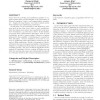Free Online Productivity Tools
i2Speak
i2Symbol
i2OCR
iTex2Img
iWeb2Print
iWeb2Shot
i2Type
iPdf2Split
iPdf2Merge
i2Bopomofo
i2Arabic
i2Style
i2Image
i2PDF
iLatex2Rtf
Sci2ools
128
click to vote
SIGMETRICS
2010
ACM
2010
ACM
Dynamics in congestion games
Game theoretic modeling and equilibrium analysis of congestion games have provided insights in the performance of Internet congestion control, road transportation networks, etc. Despite the long history, very little is known about their transient (non equilibrium) performance. In this paper, we are motivated to seek answers to questions such as how long does it take to reach equilibrium, when the system does operate near equilibrium in the presence of dynamics, e.g. nodes join or leave. In this pursuit, we provide three contributions in this paper. First, a novel probabilistic model to capture realistic behaviors of agents allowing for the possibility of arbitrariness in conjunction with rationality. Second, evaluation of (a) time to converge to equilibrium under this behavior model and (b) distance to Nash equilibrium. Finally, determination of tradeoff between the rate of dynamics and quality of performance (distance to equilibrium) which leads to an interesting uncertainty princip...
Related Content
| Added | 18 Jul 2010 |
| Updated | 18 Jul 2010 |
| Type | Conference |
| Year | 2010 |
| Where | SIGMETRICS |
| Authors | Devavrat Shah, Jinwoo Shin |
Comments (0)

